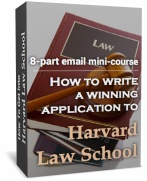While law school admissions are more of a numbers game than business school admissions, at the highest levels law school admissions can be quite subjective because elite law schools have more than enough applicants who meet the basic GPA and LSAT standards to qualify for admission. So they don’t necessarily just admit those candidates with the highest scores on both.
That is why admissions at the highest level can sometimes feel like dice roll. For example, consider:
- Boalt Hall at the University of California at Berkeley, while often considered one of the most difficult law schools in the country to gain admission to, admitted one student who was rejected everywhere else he applied. Boalt accepted him because he wrote a compelling personal statement about how he used to be part of a gang, cleaned himself up, and now wanted to channel his energies in helping other gang members get out of gang life and become more productive by learning about the legal system.
- Harvard accepted a student who was rejected by the University of Texas law school, even though UT law school ranks toward the end of the top 15 law schools. One reason is that, like all law schools that manage yield (the number of applicants who accept offers of admission), UT law school wants to increase their yield by awarding admission offers to people who are actually likely to attend, and for this reason the school tends to heavily favor in-state applicants.
- One student was accepted to Harvard Law School but rejected by Stanford. One reason could have been that, as a California resident, his application was “a dime a dozen” at Stanford, but was more “interesting” to Harvard because both schools also try to optimize a national demographic balance in the class in addition to high academic achievement.
The point is, law school admissions is not an exact science. There is definitely subjectivity in the process based on the multitude of factors the selection committee is trying to balance in optimizing a class profile. So don’t assume your chances of admission are low just because a law school is prestigious (and don’t take for granted admission at lower-ranked schools just because you meet the score cutoffs, since there are other factors at play).
We discuss in much more detail some of this type of psychology, both specific to Harvard and general to elite law schools, in our law school admissions guide “How to get into Harvard Law School (whether you have the highest scores or not)” so be sure to check it out!

